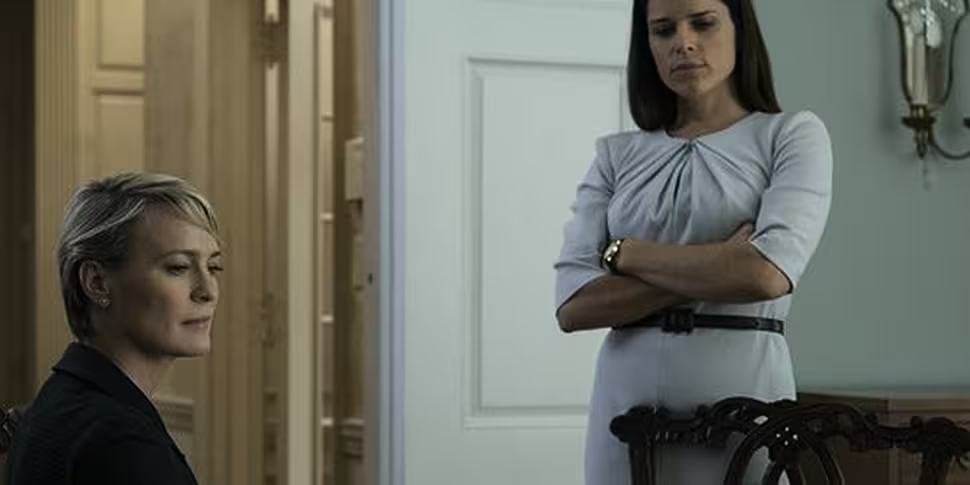In a world where we are connected all day, every day to the great hive mind of the Internet, avoiding a spoiler for a TV show or movie can be pretty difficult. Social media, in its near infinite reach into our awareness of what’s going on in the world, be it election results or funny gifs, is a strewn with plot landmines the moments after a show has ended. This is all the more frustrating when the broadcast gap between the US and the rest of us is stretched. But in the era of à la carte binges, avoiding a spoiler is nigh-on impossible.
Take House of Cards, for instance, which has become the lynchpin programme in turning viewers all around the world on to Netflix and streaming. When the subscription multinational media giant launched the Kevin Spacey-led remake of an early 1990s BBC drama in 2013, we already lived in a spoiler-strewn world. Bruce Willis is a ghost, Tyler Durden is a figment of his imagination, Maggie shot Mr Burns, Kevin Spacey is Kaiser Sozé, Kristin shot JR. Everyone dies in Game of Thrones.
But then Netflix changed the game, delivering in its entirety a show with so many twists and turns and Metro-related mishaps that not ruining the plot for the uninitiated. Buzz turned House of Cards into the show everyone was talking about, just saying very little.
Netflix offered TV critics all over the world the opportunity to see the first six episodes of the new run before this morning’s dump at 12.01am of all the new chapters, rather aptly leading to the number of cards in this House of Cards adding up to 52. But when it comes to reviewing what happens in those episodes, TV critics walk a fine line. Part of the gig is retelling the major plot points, then offering some analysis as to how the show’s cultural impact waxes or wanes based on the driving narrative. But when you have no idea at what point in the run readers or viewers are at, it’s easy to spoil it for someone.
The common consensus is that the lifespan of a spoiler-free discussion is now down to just a few months. This morning, for instance, on Newstalk, the last five minutes of Star Wars: The Force Awakens was laid bare on the airwaves, with the solo resident of Skellig Michael revealed to anyone listening in Ireland or online who hadn’t yet seen the blockbuster. As spoilers go, it’s perhaps not the biggest one in the movie, but one that could have merited a warning given that it was only released 11 weeks and one day ago.
Not everybody agrees that spoilers are the ruination of pop culture, though. In 2011, researchers at the University of California, San Diego, came to the conclusion that having a story spoiled doesn’t take any enjoyment from it, but rather enhances the story-consuming experience.
Working off a number of short stories, researchers Nicholas Christenfeld and Jonathan Leavitt presented test subjects with different versions of the same story. In one, the narrative contained the twist revealing paragraph towards the end, while in the other, that same paragraph was laid out as a preface before the story even began.
When asked to rate how much they enjoyed the stories, the readers significantly preferred the spoiled versions of the tales, even when it was a classic case of whodunit solved by Hercule Poirot. Knowing ahead of time that the Agatha Christie’s Belgian sleuth would figure out that the apparent target of an attempted murder was, in fact, the murderer all along, in no way damaged the enjoyment of the story, but actually improved it for the readers.
The conclusion the San Diego researchers reached was that, in essence, plot isn’t everything.
“Plots are just excuses for great writing. What the plot is is (almost) irrelevant,” Prof Christenfeld, an expert in social psychology, said. “The pleasure is in the writing.”
Another finding suggested that when the audience knew what the plot twist was, spotting the pieces leading up to it and recognising them improved the enjoyment of a story. Failing to notice the red herrings from the real McKoi leaves us feeling duped and looking stupid.
Though maybe if you like House of Cards, a show in which Spacey’s Francis Underwood pretty much does nothing but dupe stupid-looking people, you like being left in the dark until it’s too late to escape.









